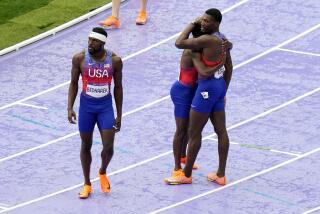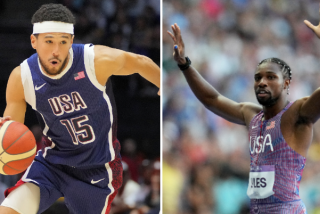LAUNCHING PAD : Lewis Takes the Long View, Vows to Keep On Jumping
- Share via
OK, let’s assume Carl Lewis does it again and wins four gold medals at the Seoul Olympics, just as he did in Los Angeles in 1984. That would cap a world-class career, right?
Not necessarily. Lewis said recently that he may retire from sprint competition after the Seoul Games, but he isn’t about to give up the long jump.
Perhaps surprisingly, he said the most important track and field achievement he has in mind these days is not necessarily the 30-foot long jump, but rather the continuation of his winning streak in the event.
Lewis hasn’t been beaten in the long jump since Feb. 27, 1981, a streak spanning 55 meets.
Only three Americans have ever jumped 28 feet but one of them, Lewis, has done it 47 times. Yet the 20-year-old world record, 29-2 1/2, still belongs to Bob Beamon. Lewis’ best is 28-10.
“People ask me a lot about getting the 30-foot jump one day,” he said.
“But my feeling is, if I get it, great. But if I don’t, I’ll be just as happy if I can keep building the win streak. The opportunity for a long jump will come. But to never lose (again) in the long jump--that’s my goal.
“Records are great, but being a winner is important, too. I think of myself more as a winner than a record setter. The competition aspects of track and field mean more to me than anything.”
When track nuts gather to number-crunch on streaks, the most commonly discussed numbers are 180, 120 and 107.
Iolanda Balas of Romania won 180 consecutive times in women’s high jump competition in the 1950s and ‘60s. Parry O’Brien, the first man to surpass 60 feet in the shotput, won 120 straight in the 1950s.
The most recently snapped streak belonged to Edwin Moses, who won 107 consecutive 400-meter hurdles races between Aug. 26, 1977, and June 4, 1987, when he was beaten by Danny Harris.
“I’ve only competed in 12 long jump competitions in the last three years,” Lewis said. “If I drop the sprints after ‘88, I think I could (run up) a big number. The way it is now, I’m stretching my emotional and physical energy over several events.”
In 1984, Lewis’ emotional energy was stretched over four events, and over a series of public relations gaffes.
Here’s a condensed version of what happened to him at the Olympics:
--He won the 100 meters, in 9.99 seconds.
--He won the 200, in 19.80.
--He won the long jump, at 28-0 1/2.
--He ran an 8.94-second anchor leg for a U.S. sprint relay team that won the gold medal in a world-record 37.83.
--He got booed.
Wait a minute. One of the most dominant Olympic Games track athletes in history, a guy who goes 4 for 4 for the first time since Jesse Owens, gets booed?
How could it happen?
Easy. Let Carl show you how:
--You decide not to show up for a couple of practice meets before the Games, irritating your sprint relay teammates who start knocking you in the papers.
--You decide not to go to the interview area after some of your events, sending over audio tapes instead.
--You get off a good long jump, 28-0 1/2, then quit. And never mind the 90,000 people sitting in those expensive seats waiting for a world record, or at least a try at one.
--You refuse to stay in the Olympic Village at USC. First you check it out. Then you say something like: “Well, it’s OK for them , but not for me.” You rent a house in Hollywood.
Ever since the Los Angeles Olympics, Lewis’ manager, Joe Douglas, has maintained that his man was treated unfairly by the media. Douglas says a major soft-drink firm was lined up for a marketing deal, then backed off when Lewis came across as a calculating opportunist during the Games.
“All the negative publicity was based on untruths, and was out of Carl Lewis’ control,” Douglas said recently.
Douglas is still upset over the flap caused by Lewis’ choice not to live in the Olympic village.
“I believe every U.S. track and field medalist except one, Alonzo Babers, lived outside the village,” he said. “Yet, Carl was the only one singled out and criticized.”
Larry Ellis, coach of the 1984 men’s Olympic track and field team, said most of his athletes had stayed in the USC village. But he said he could not confirm if all but one medalist had lived outside the village.
Douglas said Lewis took only one legal long jump because of the weather and his commitment to three other events. Lewis did attempt another jump, but fouled.
“It was getting cooler at the time,” Douglas said, “and he just wasn’t going to set a world record that day.”
Says Lewis: “Stopping after the one jump was the only decision I could have made. It was getting cold, the event had been delayed and I’d run two 200s that day.”
Douglas says terms such as aloof and arrogant are often unfairly applied to Lewis.
“What a lot of people see as aloofness is actually concentration,” he said.
“Athletes prepare for competition in many different ways. Dwight Stones, for example, talks. Carl either likes to be alone or with his family.”
Lewis isn’t predicting world-record performances at Seoul.
“There’s a very high intensity to the Olympics,” Lewis said.
“There are all the heats, the security, the crowds. . . . Every step you take there are security people telling you, ‘Go there!’ ‘Go here!’ the pushing, the pulling . . .
“It’s just not an environment conducive to world records. World records happen in major meets, but generally not.”
OK, what about four more golds in Seoul?
“Well, who can say? The athletes are better, the competition is better, the level of the world is up. But my level is up, too.”
Lewis says he’s fully confident of repeating his August 100-meter victory over Canadian sprinter Ben Johnson, who upset him at the 1987 World Championships in a world-record 9.83.
“My feeling on Ben is that the Rome (World Championships) race wasn’t a great race for me, but it was the race of a lifetime for Ben,” he said.
“I ran a better, smoother race against him last month, caught him at 80 meters, and won.” Naturally, Lewis and Douglas hope marketing prospects are more favorable after this Olympics. In the meantime, no one is planning any benefits for Lewis. One published report said he and Johnson were paid $250,000 each for their recent rematch in Zurich. Some, though, say it may have been as low as $25,000 each.
Douglas says he’s close to a major deal with a Swiss watch company.
It’s believed by some that Lewis’ income from foreign marketing deals and track appearance fees this year may approach $1 million. Sports Illustrated reported that Lewis earned more than $700,000 in 1984.
But for the Class of ‘84, it was gymnast Mary Lou Retton who made the big score on Madison Avenue.
Lewis’ marketing score book is top-heavy with deals with Japanese firms--Mizuno, Fuji Xerox, Suntory (for a sports drink) and Sagawa Express. He also has endorsement contracts for two Scandinavian firms, Arla milk and Ecco shoes.
Retton was signed by Wheaties, McDonald’s and Vidal Sassoon, among others.
Now, 1988.
Will this be the year America learns to love Carl Lewis?
More to Read
Go beyond the scoreboard
Get the latest on L.A.'s teams in the daily Sports Report newsletter.
You may occasionally receive promotional content from the Los Angeles Times.






